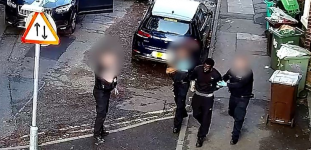The attorney general is considering whether judges should review the sentence of killer Valdo Calocane.
Calocane, 32, killed Barnaby Webber, Grace O'Malley-Kumar and Ian Coates in Nottingham last June.
The attorney general's office has received a referral arguing the sentence was too lenient, after he was found guilty of manslaughter and given an indefinite hospital order.
NHS England will also investigate his contact with mental health services.
During the sentencing at Nottingham Crown Court on Thursday, Mr Justice Turner said Calocane would "very probably" be detained in a high-security hospital for the rest of his life, after he admitted manslaughter on the grounds of diminished responsibility.
The families of those who died have expressed anger that Calocane was given a hospital order, with Mr Webber's mother saying "true justice has not been served".
She said the Crown Prosecution Service had, in November, presented her family with a "fait accompli that the decision had been made to accept manslaughter charges".
"At no point during the previous five and a half months were we given any indication that this could conclude in anything other than murder," she said.
Janine McKinney, from the CPS, said the manslaughter plea was accepted on the basis of "overwhelming" expert medical evidence, "namely that his actions were substantially impaired by psychosis resulting from paranoid schizophrenia".
It said that after three psychiatrists "agreed that a partial defence to murder on the grounds of diminished responsibility" was available to Calocane, it took the "unusual step" of commissioning a fourth psychiatric expert to review the evidence.
That psychiatrist "agreed with the conclusions of the other psychiatrists".
"On the basis of this evidence, the CPS concluded that there was no realistic prospect of conviction for murder, so accepted the pleas," it said, adding that the prosecution's case was that "although his actions and self-control were impaired, the defendant knew what he was doing was wrong".
In his sentencing remarks, Mr Justice Turner said Calocane's diagnosis of "treatment resistance schizophrenia" meant that it was "very likely that you will never be released".

Hours after the sentencing, a spokesman for Attorney General Victoria Prentis confirmed her office had received a referral arguing the sentence administered had been unduly lenient.
Law officers now have 28 days to carry out a review and weigh up whether to refer the case to the Court of Appeal to decide whether the sentence was appropriate.
Under the Unduly Lenient Sentence Scheme, anyone can ask for a crown court sentence to be reviewed if they think it is too short.
During the trial, the court heard Calocane had been diagnosed with paranoid schizophrenia. The Independent Mental Health Homicide Review will examine what lessons can be learned.
Among the questions the investigation is likely to examine is whether the killings could have been predicted or prevented.
At Calocane's sentencing hearing, it was revealed the former University of Nottingham student believed MI6 was spying on him.
His mental illness began in 2019 and he had been detained under the Mental Health Act at a psychiatric unit in Nottingham four times since May 2020.
The final time he was discharged was in February 2022, more than a year before the killings.
He was prescribed anti-psychotic medication but stopped taking it, which the prosecution said led to a further decline in his mental health.
Nottinghamshire Healthcare NHS Foundation Trust, which runs mental health services in the county, said in a statement it had "robustly" reviewed its interactions with Calocane.
Chief executive Ifti Majid said "there are many people who live with severe mental illness issues who do not offend and are supported to live well in the community".
"If a patient no longer engages with our services and support and they do not meet criteria to be detained under the Mental Health Act, they are discharged back to the care of their GP and can be referred back into our services at any time," he said.

Calocane killed University of Nottingham students Mr Webber and Ms O'Malley-Kumar, both 19, on 13 June along with Mr Coates, 65.
He then drove at pedestrians Wayne Birkett, Marcin Gawronski and Sharon Miller in the city centre.
Calocane also pleaded guilty to three counts of attempted murder.
Mr Justice Turner branded Calocane's crimes "sickening" adding his actions "shocked the nation and wrecked the lives of your surviving victims and the families of them all".
He added the "central issue" was "whether at the time of committing these offences, you were suffering from symptoms of severe mental disorder".
The judge said, however, the psychiatric evidence did not detract from the "horror" and "disastrous" impact of the offences.
He said, in his view, Calocane's abnormality of mind "significantly contributed" to him perpetrating the attacks.

Valdo Calocane showed no emotion in the dock as he was sentenced at Nottingham Crown Court
But, speaking outside the court Emma Webber, mother of Mr Webber, was critical of the Crown Prosecution Service's decision to downgrade the charge from murder.
She also accused Nottinghamshire Police's Assistant Chief Constable Rob Griffin of having "blood on his hands", following the force's failure to detain Calocane after an arrest warrant was issued in September 2022, over an assault on an officer. Nottinghamshire Police's Assistant Chief Constable Rob Griffin said he had reviewed the force's involvement.
Regarding the Unduly Lenient Sentence Scheme, recent data released by the Attorney General's Office in October showed officials were asked to look at almost 1,200 cases in 2022.
Of these, 139 were reconsidered by the Court of Appeal and, as result, 95 people were given longer sentences.
When asked on Thursday, Prime Minister Rishi Sunak said it was "right" Calocane would "spend very probably the rest of his life" in a high-security hospital.
He also said he has sent his "heartfelt condolences" to the victims' families, but declined to say whether he would order a public inquiry into the case.
Calocane, 32, killed Barnaby Webber, Grace O'Malley-Kumar and Ian Coates in Nottingham last June.
The attorney general's office has received a referral arguing the sentence was too lenient, after he was found guilty of manslaughter and given an indefinite hospital order.
NHS England will also investigate his contact with mental health services.
During the sentencing at Nottingham Crown Court on Thursday, Mr Justice Turner said Calocane would "very probably" be detained in a high-security hospital for the rest of his life, after he admitted manslaughter on the grounds of diminished responsibility.
The families of those who died have expressed anger that Calocane was given a hospital order, with Mr Webber's mother saying "true justice has not been served".
She said the Crown Prosecution Service had, in November, presented her family with a "fait accompli that the decision had been made to accept manslaughter charges".
"At no point during the previous five and a half months were we given any indication that this could conclude in anything other than murder," she said.
Janine McKinney, from the CPS, said the manslaughter plea was accepted on the basis of "overwhelming" expert medical evidence, "namely that his actions were substantially impaired by psychosis resulting from paranoid schizophrenia".
It said that after three psychiatrists "agreed that a partial defence to murder on the grounds of diminished responsibility" was available to Calocane, it took the "unusual step" of commissioning a fourth psychiatric expert to review the evidence.
That psychiatrist "agreed with the conclusions of the other psychiatrists".
"On the basis of this evidence, the CPS concluded that there was no realistic prospect of conviction for murder, so accepted the pleas," it said, adding that the prosecution's case was that "although his actions and self-control were impaired, the defendant knew what he was doing was wrong".
In his sentencing remarks, Mr Justice Turner said Calocane's diagnosis of "treatment resistance schizophrenia" meant that it was "very likely that you will never be released".
Hours after the sentencing, a spokesman for Attorney General Victoria Prentis confirmed her office had received a referral arguing the sentence administered had been unduly lenient.
Law officers now have 28 days to carry out a review and weigh up whether to refer the case to the Court of Appeal to decide whether the sentence was appropriate.
Under the Unduly Lenient Sentence Scheme, anyone can ask for a crown court sentence to be reviewed if they think it is too short.
During the trial, the court heard Calocane had been diagnosed with paranoid schizophrenia. The Independent Mental Health Homicide Review will examine what lessons can be learned.
Among the questions the investigation is likely to examine is whether the killings could have been predicted or prevented.
At Calocane's sentencing hearing, it was revealed the former University of Nottingham student believed MI6 was spying on him.
His mental illness began in 2019 and he had been detained under the Mental Health Act at a psychiatric unit in Nottingham four times since May 2020.
The final time he was discharged was in February 2022, more than a year before the killings.
He was prescribed anti-psychotic medication but stopped taking it, which the prosecution said led to a further decline in his mental health.
Nottinghamshire Healthcare NHS Foundation Trust, which runs mental health services in the county, said in a statement it had "robustly" reviewed its interactions with Calocane.
Chief executive Ifti Majid said "there are many people who live with severe mental illness issues who do not offend and are supported to live well in the community".
"If a patient no longer engages with our services and support and they do not meet criteria to be detained under the Mental Health Act, they are discharged back to the care of their GP and can be referred back into our services at any time," he said.
Calocane killed University of Nottingham students Mr Webber and Ms O'Malley-Kumar, both 19, on 13 June along with Mr Coates, 65.
He then drove at pedestrians Wayne Birkett, Marcin Gawronski and Sharon Miller in the city centre.
Calocane also pleaded guilty to three counts of attempted murder.
Mr Justice Turner branded Calocane's crimes "sickening" adding his actions "shocked the nation and wrecked the lives of your surviving victims and the families of them all".
He added the "central issue" was "whether at the time of committing these offences, you were suffering from symptoms of severe mental disorder".
The judge said, however, the psychiatric evidence did not detract from the "horror" and "disastrous" impact of the offences.
He said, in his view, Calocane's abnormality of mind "significantly contributed" to him perpetrating the attacks.
Valdo Calocane showed no emotion in the dock as he was sentenced at Nottingham Crown Court
But, speaking outside the court Emma Webber, mother of Mr Webber, was critical of the Crown Prosecution Service's decision to downgrade the charge from murder.
She also accused Nottinghamshire Police's Assistant Chief Constable Rob Griffin of having "blood on his hands", following the force's failure to detain Calocane after an arrest warrant was issued in September 2022, over an assault on an officer. Nottinghamshire Police's Assistant Chief Constable Rob Griffin said he had reviewed the force's involvement.
Regarding the Unduly Lenient Sentence Scheme, recent data released by the Attorney General's Office in October showed officials were asked to look at almost 1,200 cases in 2022.
Of these, 139 were reconsidered by the Court of Appeal and, as result, 95 people were given longer sentences.
When asked on Thursday, Prime Minister Rishi Sunak said it was "right" Calocane would "spend very probably the rest of his life" in a high-security hospital.
He also said he has sent his "heartfelt condolences" to the victims' families, but declined to say whether he would order a public inquiry into the case.


![TimedD[HIDDEN] - 40,000 Gamerscore](/data/attachments/1/1217-ef72452773819e516b177c42466d7255.jpg)
![GreenE[HIDDEN] - 40,000 Gamerscore](/data/attachments/1/1220-d6f459ea0a51f8410a9bfa56e96eb414.jpg)
![LuxuryA[HIDDEN] - 40,000 Gamerscore](/data/attachments/1/1224-7e80f87fb459411d83c2db8f3f5f6485.jpg)



![UneasyT[HIDDEN] - 271,135 Gamerscore](/data/attachments/1/1226-95feaa2515585059108ceeab733f9e28.jpg)










